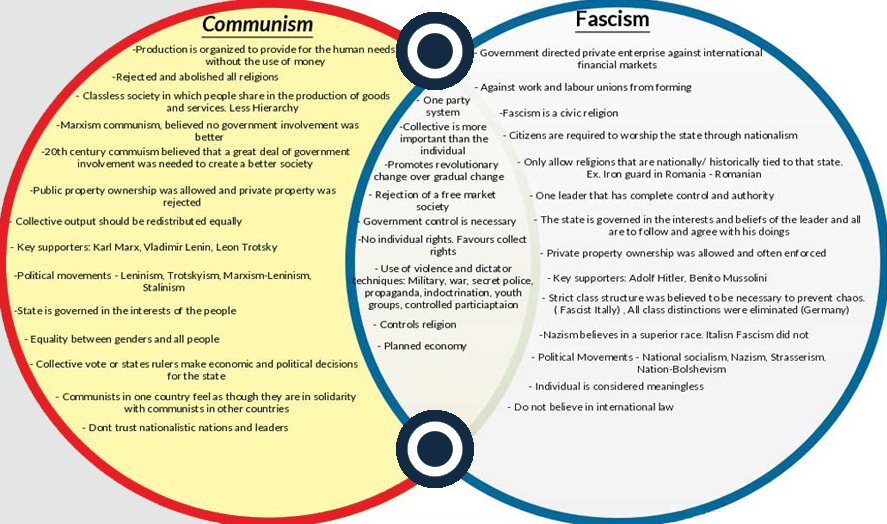Your cart is currently empty!
Both Communism and Fascism are the same; their ideological differences are an illusion and they end up functioning in a remarkably similar way. These two political systems, often seen as diametrically opposed, have nearly the exact same practical impact on society, leading to the same outcome; the centralization of power and the erosion of individual freedoms. The left and right are trying to dupe you into a losing game.
Ideological Foundations
-Communism, based on Marxist principles, advocates for a classless society where the means of production are collectively owned. It emphasizes the overthrow of capitalist systems and the establishment of a state-controlled economy aimed at achieving equality and eliminating class distinctions.
-Fascism, on the other hand, emphasizes strong nationalism, a powerful centralized state, and the collaboration between the state and large corporations. It promotes unity and order, often through authoritarian means, and seeks to suppress dissent to maintain social cohesion.
**Despite these ideological differences, the practical implementation of both systems often leads to similar outcomes for individuals in society. Heres why:
Centralization of Power
-In Communist systems, power is centralized in the hands of a bureaucratic elite who control the state and economy. Historical examples such as the Soviet Union and Maoist China illustrate how this centralization results in a powerful elite class dictating economic and social policies that dictates an individuals activities and expression.
-Fascist regimes also centralize power, but typically in the hands of a political and corporate elite, which are functionally the same. Nazi Germany and Fascist Italy demonstrated how this centralization facilitated the control of both economic activities and individual lives through authoritarian means.
**Both systems use sociocultural means to control behaviors at the individual level. Lets explore this further:
Erosion of Individual Freedoms
-Under Communism, the state’s control over the economy and society often leads to the suppression of individual freedoms. The need to maintain control and implement the state’s vision of equality results in the restriction of free speech, free association, and other civil liberties.
-Fascism similarly suppresses individual freedoms to maintain national unity and order. The authoritarian nature of Fascist regimes leads to the elimination of political dissent, freedom of the press, and personal autonomy much in the same way.
How does this relate to the concept of a developing Technocracy or Neo-Fuedalist State?
Both systems rely on technocratic governance, where decisions are made by a small group of experts or elites. In Communist systems, this is seen in the bureaucratic management of the economy and society. In Fascist systems, technocrats and corporate leaders often collaborate with the state to direct economic and social policies. This reliance on technocratic governance prioritizes efficiency and control over democratic participation, leading to the marginalization of the average citizen’s voice in decision-making processes. This is why many non-radicalized, sensible, freedom loving, & politically educated citizens refer to both of these systems under the banner of “authoritarianism”.
Communism/Fascism’s (Authoritarianism’s) impact on you:
For individuals striving to live normal lives, the similarities in the practical outcomes of Communism and Fascism become apparent. Both systems create environments where personal autonomy is Limited. The centralization of power and the suppression of dissent in both systems limit individuals’ ability to make independent choices about their lives. Whether through state control or corporate-state collaboration, personal autonomy is significantly restricted. At the end of the day the difference is objectively semantic.
Economic Opportunities are Constrained:
In Communist systems, the state’s control over the economy often leads to inefficiencies and limited economic opportunities for individuals. In Fascist systems, the corporatist economy benefits a select elite, while the broader population faces economic constraints and reduced upward mobility in almost the exact same way.
Social Mobility is Restricted
Both systems tend to entrench existing power structures, making social mobility difficult. In Communist systems, the bureaucratic elite maintain their positions of power. In Fascist systems, the collaboration between the state and large corporations solidifies the elite’s control over economic resources.
The Broader Implications: Technocratic Neo-Feudalism
The convergence of Communist and Fascist rhetoric and their practical outcomes contribute to the broader trend towards technocratic neo-feudalism. This system is characterized by the following:
Consolidation of Economic Control
Regardless of the ideological justification, both systems lead to the centralization of economic control in the hands of a few elites. This consolidation mirrors the trends specifically observed in modern neoliberal policies, where global financial elites increasingly influence economic and political decisions.
Erosion of Democratic Processes
The marginalization of individual voices and the prioritization of technocratic governance in both systems erode democratic processes. This erosion is evident in contemporary political systems where technocrats and elites wield significant influence over policymaking.
Rise of a New Elite Class
Both Communism and Fascism create and sustain a new elite class that benefits from the centralization of power. This elite class, whether bureaucratic or corporate, exercises significant control over the economy and society, leading to a new form of feudalism where the average citizen’s role is diminished.
From the perspective of an individual just trying to live a normal life, and maintain their island; Communism and Fascism functionally end up being the same. Both systems, despite their ideological differences, lead to the centralization of power, the erosion of individual freedoms, and the rise of a new elite class. This convergence facilitates the broader trend towards technocratic neo-feudalism, where a small group of elites control economic and political systems, marginalizing the average citizen and undermining democratic processes. Understanding this convergence is crucial for recognizing the underlying dynamics that shape our contemporary world and for advocating for systems that prioritize individual autonomy, economic opportunities, and the right to self governance.


Leave a Reply